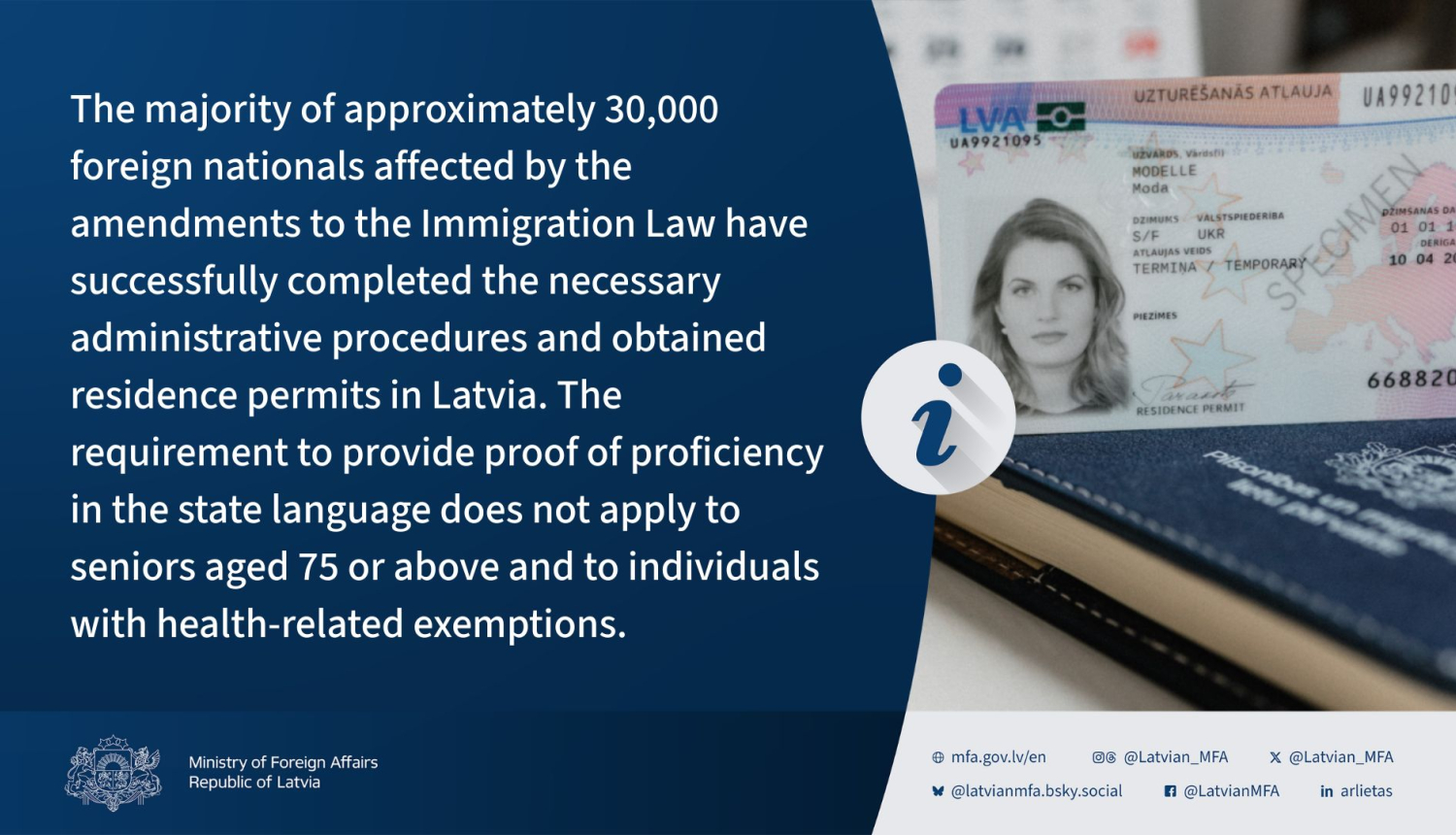The majority of approximately 30,000 foreign nationals affected by the amendments to the Immigration Law have successfully completed the necessary administrative procedures and obtained residence permits in Latvia. The requirement to provide proof of proficiency in the state language does not apply to seniors aged 75 or above and to individuals with health-related exemptions.
To promote social integration and safeguard national security, particularly in the context of Russia’s war against Ukraine and the growing intensity of Russian propaganda and disinformation, since 2022 the Saeima has amended the Immigration Law of Latvia. The amendments require those citizens of Russia, who have renounced citizenship of Latvia or the non-citizen status in favour of the citizenship of Russia, to pass a Latvian language test at A2 level in order to renew their residence permits. Individuals were given time from 2022 to acquire Latvian language skills at the required level.
According to the Common European Framework of Reference for Languages (CEFR), A2 level indicates that a person can understand and use simple phrases and sentences in everyday situations, communicate on familiar topics, and exchange basic information. Latvian is one of the 24 official languages of the European Union.
Within the prescribed time frame, the majority of the approximately 30,000 foreign nationals affected by the amendments and wishing to continue residing in Latvia have renewed residence permits. Currently, the Office of Citizenship and Migration Affairs (OCMA) has identified 500 foreign nationals whose residence permits have expired or are about to expire. Their relevant circumstances are being examined and clarified on a case-by-case basis.
In the event of an unsuccessful language proficiency test, an individual may retake the examination. However, those foreign nationals who have not demonstrated an interest in continuing to reside in Latvia – either by failing to submit the required documents or failing to provide proof of Latvian language proficiency – no longer have legal grounds to stay in the Republic of Latvia.
In connection to the above, it has been established that 10 foreign nationals are residing in Latvia illegally. Consequently, the OCMA has been obliged to issue them with orders to leave the country.
On 15 February 2024, the Constitutional Court ruled that the amendments to the Immigration Law are consistent with the Constitution and with Article 4 of Protocol No. 4 to the European Convention for the Protection of Human Rights and Fundamental Freedoms.
Additional information:
- The State language of the Republic of Latvia is Latvian, as stipulated by the Constitution of the Republic of Latvia and the State Language Law.
- Latvia’s social integration policy, implemented for over 30 years to overcome the legacy of occupation, has been built around the Latvian language and culture as unifying elements for different ethnic groups. Since the restoration of independence, successive governments have actively promoted learning of the Latvian language. As a result, 86% of Latvia’s residents now speak Latvian, and this proportion continues to grow.
- The status of the Latvian as the sole State language has been defended by Latvia in several cases before the European Court of Human Rights (ECHR), including, most recently, in the cases of Valiullina and Others v. Latvia, Djibouti and Others v. Latvia, and Djeri and Others v. Latvia. These cases concerned the 2018 stage of the education reform in Latvia. The ECHR emphasised that Latvian, as the only State language of Latvia, is a constitutional value that must be protected, and that Latvia has an obligation to ensure that all residents are able to communicate freely in it. The ECHR’s rulings confirm Latvia’s right to address the consequences of more than 50 years of Soviet occupation, during which the USSR pursued a policy of Russification and suppressed the Latvian language.
- The Constitutional Court, when examining cases concerning Latvian as the sole language of instruction in education, noted, that the use of the Russian language in Latvia remains widespread. To overcome the lingering effects of the Soviet Russification, it is necessary to further strengthen the status of Latvian as the only State language in Latvia. Insufficient Latvian language proficiency among some members of minority groups continues to hinder their full participation in democratic processes and affects their success in the labour market.




